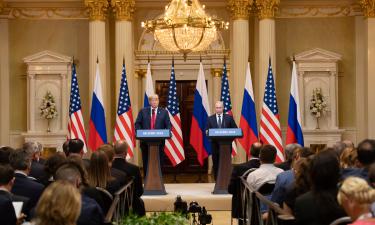Insurgents target Iraqi security forces around Baqouba; offensive in Tal Afar intensifies
Insurgents killed 19 Iraqi security forces in clashes around Baqouba, while U.S. and Iraqi forces intensified an offensive in a rebel-infested city that the Americans subdued last year _ only to have the Iraqis lose control.
Eight policemen died in a pair of shootouts Saturday in Baqouba, 35 miles (56 kilometers) northeast of Baghdad, officials said. Six policemen and two soldiers were killed in another gunbattle in Buhriz, a suburb of the Baqouba, officials said.
Three Iraqi soldiers also died Saturday when their convoy was attacked by gunmen near Adhaim, 30 miles (48 kilometers) north of Baqouba, police said.
To the north, fighting raged for a second day Saturday in the outskirts of Tal Afar, an ethnically mixed insurgent stronghold.
U.S. and Iraqi officials urged civilians to leave affected areas of the city, 260 miles (418 kilometers) northwest of Baghdad, a sign that the Americans were preparing a major assault. U.S. forces crushed insurgents in Tal Afar last fall, leaving only about 500 American soldiers behind and handing over control to the Iraqis.
But Iraqi authorities lost control of the city, and insurgent ranks swelled. That forced the U.S. command to shift the 3rd Armored Cavalry Regiment from the Baghdad area to Tal Afar to restore order.
On Saturday, U.S. and Iraqi forces were firing at insurgents on the western side of the city, Iraqi officials said. Elsewhere, American and Iraqi forces were moving house-to-house, searching for weapons and arresting men capable of firing them, Iraqi authorities said.
Hospital officials said they were unsure of casualties because it was too dangerous for ambulances to reach the area. Officials said they hoped to get ambulances into the area Sunday.
Elsewhere, four civilians were killed and 11 wounded when four mortar shells fired at a U.S. installation missed the target and exploded in a mixed residential and commercial area of Samarra, the U.S. military and Iraqi police said.
The blasts shattered shops and left pools of blood on the dusty streets of the city, 60 miles north of Baghdad. Doctors and nurses at the local hospital struggled to bandage the wounded, some of them with horrific shrapnel wounds. Doctors hovered over one man with bone protruding from his left leg.
A 10-year-old boy lay naked on a bed, his head, arm and leg swathed in bandages. Rumors spread that the Americans fired the rounds, but U.S. and Iraqi officials insisted they did not.
"We were at work and were hit by a mortar round while trying to earn bread for our children," shouted one man who would not give his name. "It was a workshop for God's sake. Where is the government? Where is the Cabinet? How long will the Americans continue to do this? No religion accepts these acts, not even the Christians."
Gunmen also abducted three Iraqi contractors after they left the U.S.-run Taji air base some 10 miles (16 kilometers) north of Baghdad, police Lt. Miqdad al-Khazragi said.
U.S. and Iraqi soldiers killed one insurgent and arrested 10 others in operations starting late Friday in the Mosul area, the military said.
U.S. and Iraqi officials had hoped that a new constitution, finalized Aug. 28 after weeks of intense negotiations, would help bring Iraq's factions together and in time lure Sunni Arabs away from the Sunni-dominated insurgency.
Instead, the bitter talks sharpened communal tensions, at a time when both Sunnis and Shiites accused extremists from the other community of killing their civilians. Discreet talks are under way to make changes in the language of the draft to ease Sunni Arab hostility to the document.
However, both Sunni and Shiite community leaders are gearing up for a decisive political battle in the Oct. 15 referendum. Sunni clerics are urging their followers to reject the charter while most of the Shiite clergy supports it.
Hundreds of Sunni Arabs met in Baghdad on Saturday to urge the defeat of the constitution, which threatens "Iraq's division."
The head of the biggest Shiite party, the Supreme Council for the Islamic Revolution in Iraq, said Saturday there was a "conspiracy to annihilate the Shiite sect in Iraq."
Party leader Abdul-Aziz al-Hakim spoke at a funeral for some of the nearly 1,000 Shiites killed in the stampede that broke out Thursday during a Shiite procession at a Baghdad bridge. The stampede began because of rumors that a suicide bomber was among the crowd.
In other developments Saturday:
_Officials in Ramadi said they had selected 21 members of a new city council, two of them women, despite insurgent threats. The new lineup was to be announced Monday.
_Police found three unidentified corpses in the Tigris River north of Baghdad, possible victims of insurgent or sectarian violence.
_Three gunmen set fire to fruit and vegetable stalls in a mostly Sunni neighborhood of western Baghdad.
_Two men were killed and one were wounded in a drive-by shooting at a Sunni mosque in north Baghdad, police said.
_ The International Committee of the Red Cross said its partner organization, the Iraq Red Crescent, sent 50 volunteers to set up a first aid center for victims of the stampede in Baghdad, as well as vehicles and medical supplies, AP reported.
Subscribe to Pravda.Ru Telegram channel, Facebook, RSS!





